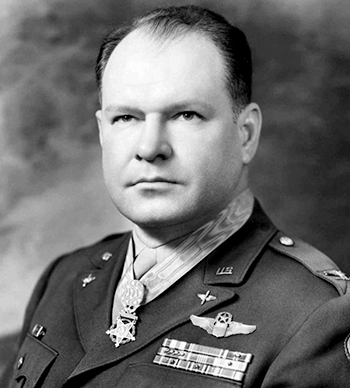
|
John R. "Killer" Kane |
 |
|||
| Rank, Service | ||||
Colonel O-6, U.S. Air Force |
||||
| Veteran of: | ||||
|
||||
| Tribute: | ||||
John Kane was born on January 5, 1907, in McGregor, Texas. He graduated with a bachelor's degree from Baylor University in Waco, Texas, on May 30, 1928, and then attended Washington University Medical School in St. Louis, Missouri, from 1928 to 1930. Kane enlisted in the Aviation Cadet Program of the U.S. Army Air Corps on June 25, 1931, and attended Primary Flying School at Brooks Field, Texas, from June to October 1931. He then attended Basic Flying School at Randolph Field, Texas, from October 1931 to March 1932, and Advanced Flying School at Kelly Field, Texas, from March 1932 until he was commissioned a 2nd Lieutenant in the U.S. Army Air Corps and awarded his Pilot Wings on June 29, 1932. His first assignment was as a Keystone B-6 and Fokker C-15 pilot with the 30th Bomb Squadron at Rockwell Field, California, from July to October 1932, followed by service as a B-6 and B-2 Condor pilot with the 9th and 11th Bomb Squadrons at March Field, California, from October 1932 until he left active duty on June 30, 1933. Lt Kane served in the Air Corps Reserve from July 1, 1933, until he returned to active duty on August 15, 1935. He served as a Consolidated A-11, A-12 Shrike, and A-17 Nomad pilot with the 90th Attack Squadron; and as a B-18 Bolo pilot with the 13th Bomb Squadron at Barksdale Field, Louisiana, from August 1935 to March 1940. Capt Kane next served as a B-18 pilot with the 27th Air Base Squadron at MacDill Field, Florida, from March 1940 to February 1941, followed by service as a B-18 pilot and Commanding Officer of Headquarters Squadron, 3rd Air Force, at Tampa, Florida, from February to September 1941. He served as a B-17 Flying Fortress pilot and as Operations Officer for the 43rd Bomb Squadron of the 20th Bomb Group at McDill Field from September 1941 to February 1942, and then as a B-24 Liberator pilot and as the first Commander of the 344th Bomb Squadron of the 98th Bomb Group from February to December 1942. During this time, Lt Col Kane stood up the unit and trained combat aircrews in the United States at MacDill Field, Florida, at Barksdale Field, Louisiana, at Fort Myers Army Air Field, Florida, and at Drane Field, Florida, from February to July 1942; and then in combat flying out of Israel from July to November 1942, and then out of Egypt from November to December 1942. Col Kane next served as a B-24 pilot and Commander of the 98th Bomb Group in Egypt from December 1942 to January 1943, out of Libya from January to September 1943, and then out of Tunisia from September to October 1943. During this time Col Kane led the famous low-level bombing raid on German-held oil refineries at Ploesti, Romania, on August 1, 1943, for which he would be awarded the Medal of Honor. He returned to the United States in November 1943, and then served as Station Commandant of the 29th Combat Crew Training School (redesignated the 212th Army Air Force Base Unit on July 1, 1944), at Gowen Field, Idaho, training B-24 Liberator crews from February to December 1944. His next assignment was as Base Commander of the 245th Army Air Force Base Unit at McCook Field, Nebraska, from December 1944 to August 1945, training B-17, B-24, and B-29 Superfortress aircrews; followed by service as Deputy Air Base Commanding Officer of the 211th Army Air Force Base Unit at Sioux Falls Army Air Base, South Dakota, from August to September 1945. Col Kane served as Air Base Commander of the 235th and 230th Army Air Force Base Units at Biggs Field, Texas, from September to December 1945, and then as Base Commander of the 242nd Army Air Force Base Unit at Grand Island Army Air Field, Nebraska, from January to May 1946. He attended National War College in Washington, D.C., from August 1946 to June 1947, and then served as Base Executive Officer of Chanute Field, Illinois, from June 1947 to April 1948. His next assignment was as Director of Technical Schools at Lowry Air Force Base, Colorado, from April to August 1948, followed by service as Inspector General at Lowry AFB from August 1948 to January 1949. Col Kane served as Commanding Officer of the 3415th Maintenance and Supply Group at Lowry AFB from January to June 1949, and he then served as Chief of Staff of Ladd AFB, Alaska, from June to November 1949. His next assignment was as Base Commander of Ladd AFB from November 1949 to March 1950, followed by service as Chief of Staff of Ladd AFB from March 1950 to July 1951. He served as Commanding Officer of the Air Resupply and Communications Service, Military Air Transport Service, in Washington, D.C., from July to November 1951, and then as Commander of the 580th Air Resupply and Communications Wing at Mountain Home AFB, Idaho, from November 1951 to August 1952, and then deployed to Libya from August 1952 to May 1953. Col Kane's next assignment was as Commander of the 549th Air Control and Warning Group and then the 316th Air Division in Morocco from May to December 1953, followed by service as Base Commander of Smoky Hill AFB, Kansas, from December 1953 until he resigned his commission in the U.S. Air Force on May 10, 1954. Col Kane was appointed a Colonel in the U.S. Air Force Reserve on July 3, 1956, to allow him to retire with full military benefits on August 1, 1956. John Kane Flew West on May 29, 1996, and was buried at Arlington National Cemetery. |
||||
|
||||

